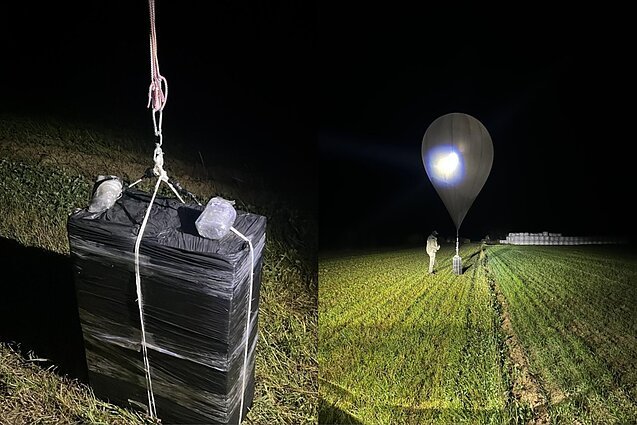Introduction to cigarette smuggling in weather balloons
Recently, a new hybrid pressure method has been recorded in Lithuania – cigarette smuggling in weather balloons, originating from the territory of Belarus. These incidents disrupt air traffic, pose a threat to civil flights and paralyze the work of airports. The Lithuanian government has therefore closed the border with Belarus until November 30, and the European Union has warned Minsk of possible additional sanctions if this “balloon attack” does not stop. Lukashenko’s story – without logic and without responsibility Instead of admitting responsibility for systematic violations of airspace, the leader of Belarus, Aliaksandr Lukashenka, chose another path – he accused the Lithuanians. According to him, “Lithuanian smugglers” themselves buy cigarettes in Belarus and send the balloons to Lithuania themselves. Allegedly, the Belarusians only “sold the goods” and there is no fault in this.
However, such a version fails from simple economic logic.“
What kind of business is it to throw a product into the wind without knowing where it will land? Smuggling always operates in an organized manner – and here we are talking about chaos that does not bring profit,” the author’s analysis reads. Cigarette factories in Belarus are state-owned, so it is naive to claim that such shipments take place “without the knowledge of the authorities”. These are not small underground transactions, but well-coordinated chains, the profits of which reach millions of euros.garette Smuggling via Weather Balloons.
A tool of hybrid warfare
Experts emphasize that these incidents are not only an economic problem, but also an element of hybrid warfare. After attempts to put pressure on migrant flows failed, Minsk resorted to other forms – from cyber provocations to smuggling, which violates Lithuanian airspace and destabilizes the region. Lithuania already officially considers these actions a “hybrid attack on state security”, and the EU is considering additional sanctions against regime structures involved in the organization of smuggling. “This is not a question of cigarettes, but a question of state sovereignty,” notes Dalius Andriukaitis. “The balloons are just a symbol of how even the smallest ways can test our defensive reflexes.”
Smugglers’ Business Policy
Over the past five years, smuggling networks have become extremely professional. They know how to use meteorological data, calculate wind directions, and fill balloons so that the cargo lands near the border. However, the latest “chaotic” shipments do not indicate professional behavior, but rather a provocation – a signal to force Lithuania to react and fill the public space with disinformation. At the same time, Belarusian officials are using ambiguous phrases – from “we have nothing to do here” to “we will apologize if we are guilty”. Such a position resembles the theater of political manipulation, when facts are deliberately replaced with words.
What to do for Lithuania and civil society
State institutions must maintain two principles: professionalism and cool-headedness. The response must be coordinated, legal and based on facts, not emotions. The civilian population can also contribute – but only in legal ways: by reporting incidents, informing officials, and supporting public campaigns against the illegal tobacco market. “If the regime says that the state has nothing to do with it, then our citizenship must be doubly strong. But citizenship is not revenge, but responsible defense,” the author emphasizes.
Conclusion
The balloons with cigarettes flying over the border are neither a coincidence nor a “Lithuanian business experiment.” This is a coordinated measure of hybrid influence, the purpose of which is to test Lithuania’s reaction, disrupt everyday life, and create chaos. Only accurate information, international cooperation, and public awareness can stop this dangerous game.
Author: Dalius Andriukaitis
Article prepared for the news portal “Lietuvos Valstybė”

